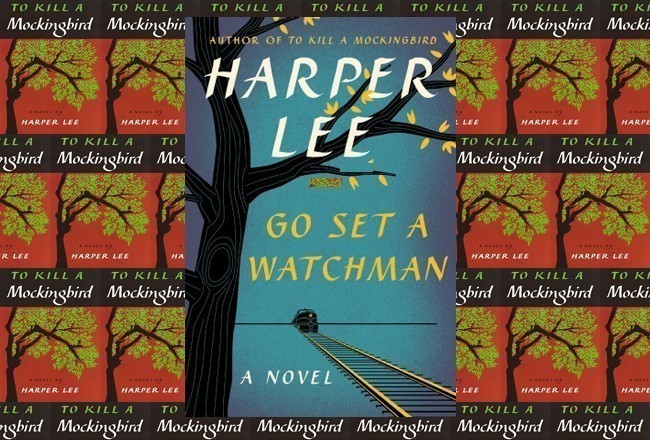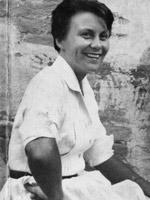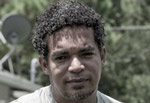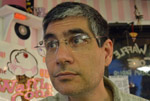
Welcome to part seven of FlaglerLive’s live-blogging of “Go Set a Watchman.” We’ve invited 10 people of varied backgrounds from around the community to read the book and write their response to each of its 19 chapters, from whatever perspective they choose, at whatever length they choose, in 19 installments over the next few weeks. For a few more details on the project, read the introduction here. As always, we start with a summary of the chapter at hand and dive into the critics’ responses. So you’re forewarned: the spoiler alert is implied.
Since the last installment earlier this week we’ve had another minor literary event that seems to skim a little something off “Watchman”‘s coattails, or at least off the coattails of its marketing scheme. Random House published “Let Me Tell You,” a collection of “New Stories, Essays, and Other Writings” by Shirley Jackson, the great writer of “The Lottery,” many other stories that gnaw with unease, and a couple of fine novels. The 50th anniversary of Jackson’s death is next week. No one in those 50 years saw the need to publish further fragments from her oeuvre. Why now, and what quality do these mostly unfinished or draft-form pieces present? The answer is Watchman-like, although in Jackson’s case maybe the distance from her death provides enough of a buffer to justify publishing what will lend a few notes of interest to Jackson fans. Jackson was in most regards a more polished, more subtle, more interesting writer than Lee, with a much broader range and just as much to say about the stifling vise of convention. She died in her prime, never showing the sort of affectations Lee did: she kept writing, as writers do, and did not hide, as most writers don’t need to since most writers are ignored anyway outside of book pages and college campuses. As revelations from long-dead authors go, there could be worse. And as hauntings from Hill House go, these may be a safer bet than Watchman.
–Pierre Tristam
![]()

Our Ten Critics: Quick Links
- Today’s Chapter Summary
- Monica Campana
- Mark Carpanini
- Inna Hardison
- Daniel Masbad
- Bill McGuire
- Brian McMillan
- Mary Ann Clark
- Jon Hardison
- Pierre Tristam
![]()
Chapter 7 summary: Jean Louise is in church. The preacher, Mr. Stone, is very dull. The sermon is about Isaiah 26, which includes the verse from which the title of the novel is drawn. The congregation sings the Doxology–a hymn of praise–but in “a rendition as much tradition of Southern Methodism as Pounding the Preacher.” The organist, Mrs. Clyde Haskins, and Herbert Jemson, apparently the music director, are trying something new, suggested to Herbert at a teaching camp by a prelate from New Jersey, who thinks Southern hymns should be chucked in favor of a more northerly interpretation. After describing the, to her ears, awful interpretation, with many variations, Jean Louise hears her uncle Dr. Finch analyze the result with Herbert, who assures him that it was only a one-time experiment. Dr. Finch is incensed that the northern preacher would impose on Southern ways. It’s an echo of his brother Atticus’s mounting displeasure with northern interference. That part of the episode is presented objectively: Jean Louise only listens.
 Monica Campana, just-retired head librarian at Indian Trails Middle School and free-speech advocate: Spending Sunday morning in church (preferably Baptist but Methodist will do) is a prerequisite for living in the South. When my husband and I bought our first little house in Wilmington, N.C., in 1976, we were greeted by a neighbor’s knock on the door. Thumbs hooked in his overalls, he drawled, “Y’all are Catholic, right?” He may as well have added, “damn Yankees.” The feeling never left that we didn’t quite fit in so several years later we jumped at the opportunity to move to Florida, where we hoped people were more tolerant. Sometimes we’re still not sure we made the right decision (see the recent story of racist graffiti in a Palm Coast neighborhood). Lee captures the scene and mood perfectly—she is at her best giving us sweet and sour descriptions of the southern lifestyle. She uses her wry wit to poke fun at “the warmness that prevails among diverse individuals who find themselves in the same boat for one hour each week.” Her description of the music director romping madly ahead while playing the Doxology and the congregation intoning slowly to its bitter end is an indicator of the unwillingness of Maycomb to deal with progress and change. Lee hints at the crux of the story to come with the quote from Isaiah that gave the book its name. All in all, a much more satisfying chapter with the quality of writing that Lee still deserves accolades for.
Monica Campana, just-retired head librarian at Indian Trails Middle School and free-speech advocate: Spending Sunday morning in church (preferably Baptist but Methodist will do) is a prerequisite for living in the South. When my husband and I bought our first little house in Wilmington, N.C., in 1976, we were greeted by a neighbor’s knock on the door. Thumbs hooked in his overalls, he drawled, “Y’all are Catholic, right?” He may as well have added, “damn Yankees.” The feeling never left that we didn’t quite fit in so several years later we jumped at the opportunity to move to Florida, where we hoped people were more tolerant. Sometimes we’re still not sure we made the right decision (see the recent story of racist graffiti in a Palm Coast neighborhood). Lee captures the scene and mood perfectly—she is at her best giving us sweet and sour descriptions of the southern lifestyle. She uses her wry wit to poke fun at “the warmness that prevails among diverse individuals who find themselves in the same boat for one hour each week.” Her description of the music director romping madly ahead while playing the Doxology and the congregation intoning slowly to its bitter end is an indicator of the unwillingness of Maycomb to deal with progress and change. Lee hints at the crux of the story to come with the quote from Isaiah that gave the book its name. All in all, a much more satisfying chapter with the quality of writing that Lee still deserves accolades for.
 Circuit Judge Mark Carpanini took office in the Tenth Judicial Circuit in Florida in 2005 in Polk County, where he still serves: I take Chapter 7 on two levels. The First is a vignette of a small town mainstream protestant church. Having attended a Lutheran church in Lakeland, Fla., it evokes familiar territory. Any little change to the service will elicit shock at least among the long time members, and possibly outright resentment and hostility. Especially with something as fundamental as the doxology.
Circuit Judge Mark Carpanini took office in the Tenth Judicial Circuit in Florida in 2005 in Polk County, where he still serves: I take Chapter 7 on two levels. The First is a vignette of a small town mainstream protestant church. Having attended a Lutheran church in Lakeland, Fla., it evokes familiar territory. Any little change to the service will elicit shock at least among the long time members, and possibly outright resentment and hostility. Especially with something as fundamental as the doxology.
I remember some lingering hostility in the Lutheran church that existed long after a beloved hymnal was officially changed. In these churches (and admittedly most churches) members tend to sit in the same pews week after week, and woe be unto anyone who disturbs the seating arrangement. Despite the mandate to welcome visitors with open arms, unfamiliar faces are scrutinized with inordinate suspicion. On another level, the hostility towards all things northern becomes evident, as evidenced by the suspicion towards the music director because of his liberal tendencies and his friendship with his “yankee brethren.”
When the music director, held in a state of almost indentured servitude as many music directors are, relates that it was suggested at a seminar by someone from New Jersey that certain hymns were inappropriate because they were too southern, Dr. Finch suggests that it was perhaps not enough for those in the north to be content with the Supreme Court’s activities: they must also change something as fundamental as religious services in the south. Clearly, the threat from the north is viewed as in a sense existential by at least Dr. Finch. Clearly it is for him yet another chapter in the ongoing oppression of the south by the north.
 Inna Hardison, co-owner of Ha Media and former publisher of Palm Coast Lifestyles magazine:Full disclosure: at the risk of getting promptly kicked out of this cool club, I don’t do church. I’ve been to quite a few of course, but always as a tourist, none of them Methodist and none of them in the South of any country. Church was a place my mother went to with a few friends when she was a young teen to partake of the generous portions of cheap wine. The massive pretty ones I went into in the various large cities were mere museums, where one walked and talked softly, gawked at the murals and the stained glass, asked stupid questions about the crucifix or why a priest wore what looked like a pretty dress and ran out of giggling, not the least bit embarrassed for it.
Inna Hardison, co-owner of Ha Media and former publisher of Palm Coast Lifestyles magazine:Full disclosure: at the risk of getting promptly kicked out of this cool club, I don’t do church. I’ve been to quite a few of course, but always as a tourist, none of them Methodist and none of them in the South of any country. Church was a place my mother went to with a few friends when she was a young teen to partake of the generous portions of cheap wine. The massive pretty ones I went into in the various large cities were mere museums, where one walked and talked softly, gawked at the murals and the stained glass, asked stupid questions about the crucifix or why a priest wore what looked like a pretty dress and ran out of giggling, not the least bit embarrassed for it.
So with that, anything that actually happens in church, the songs, the hymns, the sermons, all of it is entirely foreign to me. The chagrin Scout and Dr. Finch feel so acutely over the bastardization of Doxology I can only relate to in the dimmest of ways, and frankly, the rest of the theological happenings bored me senseless, though I don’t blame Lee for this bit of boredom. I am simply lacking any system of reference to feel any of it deeply or at all.
I am a tad miffed that Lee chose to disclose the secret and the mystery behind the title of the book though. I feel as though some discovery was taken away from her readers, at least the ones well versed in all things Biblical. Thrilled to see Jack Finch again though, and quite in his element, it seems. I’ve always liked the good doctor, and there is a tiny bit of hope that Lee simply doesn’t have enough pages left in this book to ruin him for me.
 Daniel Masbad, 2015 high school graduate (home-schooled) and concertmaster of the Flagler Youth Orchestra: Chapter Seven and still struggling to find anything intelligent or useful to contribute. At the outset, I didn’t wish to make any comparisons to To Catch a Mockingjay in the Rye (that book and this were both written by the same man, right?), but maybe now I should start? The book isn’t even as bad here as it has been before. We are simply given more flavorless characterization and a dull church story, but also some surprisingly not dull criticism of said “the Church.” I liked “Family night every Wednesday,” and “pep up the Doxology.” It’s meaningless, though, as it stands alone.
Daniel Masbad, 2015 high school graduate (home-schooled) and concertmaster of the Flagler Youth Orchestra: Chapter Seven and still struggling to find anything intelligent or useful to contribute. At the outset, I didn’t wish to make any comparisons to To Catch a Mockingjay in the Rye (that book and this were both written by the same man, right?), but maybe now I should start? The book isn’t even as bad here as it has been before. We are simply given more flavorless characterization and a dull church story, but also some surprisingly not dull criticism of said “the Church.” I liked “Family night every Wednesday,” and “pep up the Doxology.” It’s meaningless, though, as it stands alone.
 Bill McGuire, Palm Coast City Councilman and management consultant: I have chosen to combine chapters six and seven since they both dwell on the topic of Sunday religious services in Maycomb. As in many Southern and Midwestern towns Sunday church has certain timeless rituals. The women of the church are preoccupied with how they look and how they are visualized by the other dowagers in the congregation. Aunt Alexandra continues to be somewhat of a comedic foil. I’m still marveling at the fact that her husband deserted many years ago because he would rather sit on a muddy bank and fish then partake of her company. I guess every family has some middle-aged female member who spends most of her waking life putting on airs and trying to be something that she is not. I could write a small volume on the ones in my family, and I’ll bet you could too.
Bill McGuire, Palm Coast City Councilman and management consultant: I have chosen to combine chapters six and seven since they both dwell on the topic of Sunday religious services in Maycomb. As in many Southern and Midwestern towns Sunday church has certain timeless rituals. The women of the church are preoccupied with how they look and how they are visualized by the other dowagers in the congregation. Aunt Alexandra continues to be somewhat of a comedic foil. I’m still marveling at the fact that her husband deserted many years ago because he would rather sit on a muddy bank and fish then partake of her company. I guess every family has some middle-aged female member who spends most of her waking life putting on airs and trying to be something that she is not. I could write a small volume on the ones in my family, and I’ll bet you could too.
Church service, as expressed in our story, is also a sad commentary on religious expression in many communities, and not necessarily small communities. The minister drones on interminably, his message is judgmental, not particularly inspirational, and one can only wonder if any of the congregation leave the church spiritually uplifted. Nevertheless, certain rituals must be observed The ladies, especially the middle-aged spinsters are dressed to the nines. They sit together, a solid phalanx of Christian, platitudinous busybodies. We are also introduced in this chapter to the brother of Atticus, one Dr. John Finch, who seems to be portrayed as a community intellectual, far more learned than the other citizens of the community and given to flaunt his literary acumen frequently. Everyone seems to be taking different degrees of humor from the escapades of Jean Louise and Henry on the previous evening. Dr. John’s sardonic commentary seems to be the majority opinion. Analysis of the church ritual includes passing the collection plate and the proper delivery of the church’s hymns. Here we touch upon the first incident where Southern sensitivities are offended by the incursion of the North. Which hymns should be sung, and how can they be sung is a bone of contention for some of the members of the congregation. The minister does not seem to be particularly popular and certainly not very influential. As in many churches, particularly small Protestant churches, the ministers are chosen by the regional hierarchy and assigned to the church in question. The minister, Mr. Stone, has clearly not won over his flock. Being labeled a liberal in a southern conservative community does not bode well for his tenure.
The rest of the chapter deals with critical analysis of the hymns and the way they should be delivered. It is reminiscent of bumper stickers that were prominently displayed in the South not too many years ago, “We don’t care how you did it up north!” Having been presented with some of the personalities and mores of the South we are now ready to move forward and consider early aspects of the civil rights efforts, which is what I thought this book was going to be about when I started reading it.
 Brian McMillan, columnist and executive editor of the Palm Coast Observer:Chapter seven takes place mostly in church, and again we have a mention of Jem, as Jean Louise recalls wearing a hat to his funeral. She seems to think about her brother’s death daily, and it provides an interesting question for any writer: Is it more powerful to write about the death itself and the tragedy as a fresh occurrence? Or is it more powerful to write about the grief that remains forever afterward?
Brian McMillan, columnist and executive editor of the Palm Coast Observer:Chapter seven takes place mostly in church, and again we have a mention of Jem, as Jean Louise recalls wearing a hat to his funeral. She seems to think about her brother’s death daily, and it provides an interesting question for any writer: Is it more powerful to write about the death itself and the tragedy as a fresh occurrence? Or is it more powerful to write about the grief that remains forever afterward?
And, is it possible to effectively dramatize the grief only, without dramatizing the death as well — without putting the reader through the same tragedy as the character went through? Most of our experience in life, insofar as it is impacted by tragedy, comes after the tragedy, so in some ways it seems more useful to write about how one deals with the grief for the rest of your life.
The other interesting point is the cultural and class clash between north and south. The preacher in Maycomb is from the north and seems to think that everything in the north is superior. The south’s inferiority complex persists today, although to a lesser degree now that so many southerners are actually transplants from the north.
I think that attitudes toward race have also impacted by this north-south divide. Once the north started to take a stand against racism, the south’s reaction was, “Stay out of our business.” Racism has always been a bigger problem in the south, but it’s likely compounded by that inferiority complex and the human aversion to being told what to do.
 Mary Ann Clark, founder of Flagler Reads Together and president of the Flagler County Historical Society: And now to Sunday school and church with the Finches segregated by sex for no known reason, with plenty of time to meditate during the sermon. The choir’s surprising, to the congregation, rendition of the Doxology (one of my favorite hymns) is a good example of the “evils” of sending representatives to workshops where newfangled ideas are presented!
Mary Ann Clark, founder of Flagler Reads Together and president of the Flagler County Historical Society: And now to Sunday school and church with the Finches segregated by sex for no known reason, with plenty of time to meditate during the sermon. The choir’s surprising, to the congregation, rendition of the Doxology (one of my favorite hymns) is a good example of the “evils” of sending representatives to workshops where newfangled ideas are presented!
Learning the origin of the title of this book prompted me to read Isaiah 21. My interpretation is that the watchman learns that Babylon’s gods had fallen and been destroyed just as Lee is going to write of her disappointment in her father, her guiding light.
 Jon Hardison, co-owner of Ha Media in Palm Coast and member of the FlaglerLive board of directors: Church? I know nothing of church! How in god’s name am I to make sense of any of this? “North ba—d! South good!” I got that loud and clear. (No offense intended or taken.) That said, it’s clear these folks feel intruded upon and for all I know they’re correct. But little has been said thus far about Scout’s position on such things. Her two feet are firmly planted on two sides on this fence – no, wall. Does proximity to New York, the worst of the North, afford her a better of worse view of this imposing evil? I’m running long on questions and very short on answers.
Jon Hardison, co-owner of Ha Media in Palm Coast and member of the FlaglerLive board of directors: Church? I know nothing of church! How in god’s name am I to make sense of any of this? “North ba—d! South good!” I got that loud and clear. (No offense intended or taken.) That said, it’s clear these folks feel intruded upon and for all I know they’re correct. But little has been said thus far about Scout’s position on such things. Her two feet are firmly planted on two sides on this fence – no, wall. Does proximity to New York, the worst of the North, afford her a better of worse view of this imposing evil? I’m running long on questions and very short on answers.
 Pierre Tristam, editor of FlaglerLive: Showmanship rather than storytelling or style again gets the better of Lee in this chapter. She cannot resist using Jean Louise to set herself well above the church congregation and its rituals. Religion is an easy target, and god knows it lends itself to endless and endlessly justified skewering. But subtlety and originality here are lacking, replaced by another cascade of cliches and knowing references that make a sledgehammer of Lee’s intentions: to make an allusion to the Archbishop of Canterbury and “something out of Salisbury Cathedral” in the same paragraph suggests fishing for lazy one-liners. Is it only in Salisbury Cathedral that they “romp ahead” with their Doxology? Is it even necessary after the first cliche about the hymn’s rendition being “as much a tradition of Southern Methodism as Pounding the Preacher”?
Pierre Tristam, editor of FlaglerLive: Showmanship rather than storytelling or style again gets the better of Lee in this chapter. She cannot resist using Jean Louise to set herself well above the church congregation and its rituals. Religion is an easy target, and god knows it lends itself to endless and endlessly justified skewering. But subtlety and originality here are lacking, replaced by another cascade of cliches and knowing references that make a sledgehammer of Lee’s intentions: to make an allusion to the Archbishop of Canterbury and “something out of Salisbury Cathedral” in the same paragraph suggests fishing for lazy one-liners. Is it only in Salisbury Cathedral that they “romp ahead” with their Doxology? Is it even necessary after the first cliche about the hymn’s rendition being “as much a tradition of Southern Methodism as Pounding the Preacher”?
Lee’s simile has a point though: the church musician has just returned from some training camp where the New Jersey-inspired cantor intones against Southern Methodism’s musical methods and urges something Atticus’s brother Dr. Finch would later derisively compare to the Church of England, giving Lee yet another chance to make a third comparison, this time to Westminster Abbey. But it’s the sort of ponderous arc that straddles two commercial breaks and the assault on Stone. Preacher Stone, again in the same paragraph, has “the greatest talent for dullness he had ever seen in a man on the near side of fifty,” the he at the bar being Dr. Finch. If we didn’t quite get the message, a few words later Lee informs us that Stone “possessed all the necessary qualifications for a certified public accountant.” If we still didn’t get the message Lee unleashes a one-liner from Dr. Finch to cap the assault a couple of paragraphs later: “We asked for bread and they gave us a Stone.” Wait: there’s more: “Stone was tone deaf,” Lee tells us, deaf to the irony of her own poor pun.
There’s a point in reading a book when one begins to feel sorry for the characters at the mercy of their creator, not unlike the way we could feel sorry for the manhandling of humanity at god’s hands: however poorly developed or dull, the characters are innocent, they’re puppets, at least in the lesser novels and lesser planets (I have hope for Kepler186f). It’s the puppeteer who’s failing them (and us). Stone isn’t the dull preacher here. Lee is. With that long introduction (and I thought Lee hated introductions, at least according to her introduction to the 50th edition of Mockingbird), we get to the point: the sermon, taken from Isaiah 26, which gives Lee a chance to clue us in on the origin of her book’s title. It’s not a bad idea. Most writers get around to it one way or another. She did that on three occasions in Mockingbird, but to a magically literary crescendo of heartbreaking effect. The first reference to killing a mockingbird is a simple bit of wisdom imparted to a child, the third turns into a metaphor for the murder of Tom Robbins. So even in the telling there was a tragic progression, as in a Greek play.
Here the reference to Isaiah, so rich in Babylonian possibilities, turns into a childish play on words at the expense of the preacher that manages to sound more grown-up than the one she titters next: “doxology’s my doxy.” I was not until today aware that doxy is another word for whore, though the way she drops the word is as out of place as a liberal tramp at a Southern Baptist convention. All this for Dr. Finch’s punchline: “Apparently,” he said, “apparently our brethren in the Northland are not content merely with the Supreme Court’s activities. They are now trying to change our hymns on us.” This is no doxology. It’s good old Southern victimology. Lee then compares Herbert to “Theobald Pontifex,” a reference out of the way of all flesh that has more currency as Pope Francis’s Twitter handle (@Pontifex). The chapter ends on one last Lee-Finch burst of showmanship. Scout asks her uncle to explain an earlier obscurity he’d abbreviated as D.V., in conversation no less: “Deo volente. ‘God willin’,’ child. ‘God willin’.’ A reliable Catholic utterance.” Funny. I thought it was an ecumenical one. Lebanon’s Maronites, Sunnis, Shiites, Druze and Jews have been uttering it for centuries. Catholics were latecomers to the willin’. But Lee’s achilles heel, we now know almost as well as her editor did, was her cleverness.






























Leave a Reply